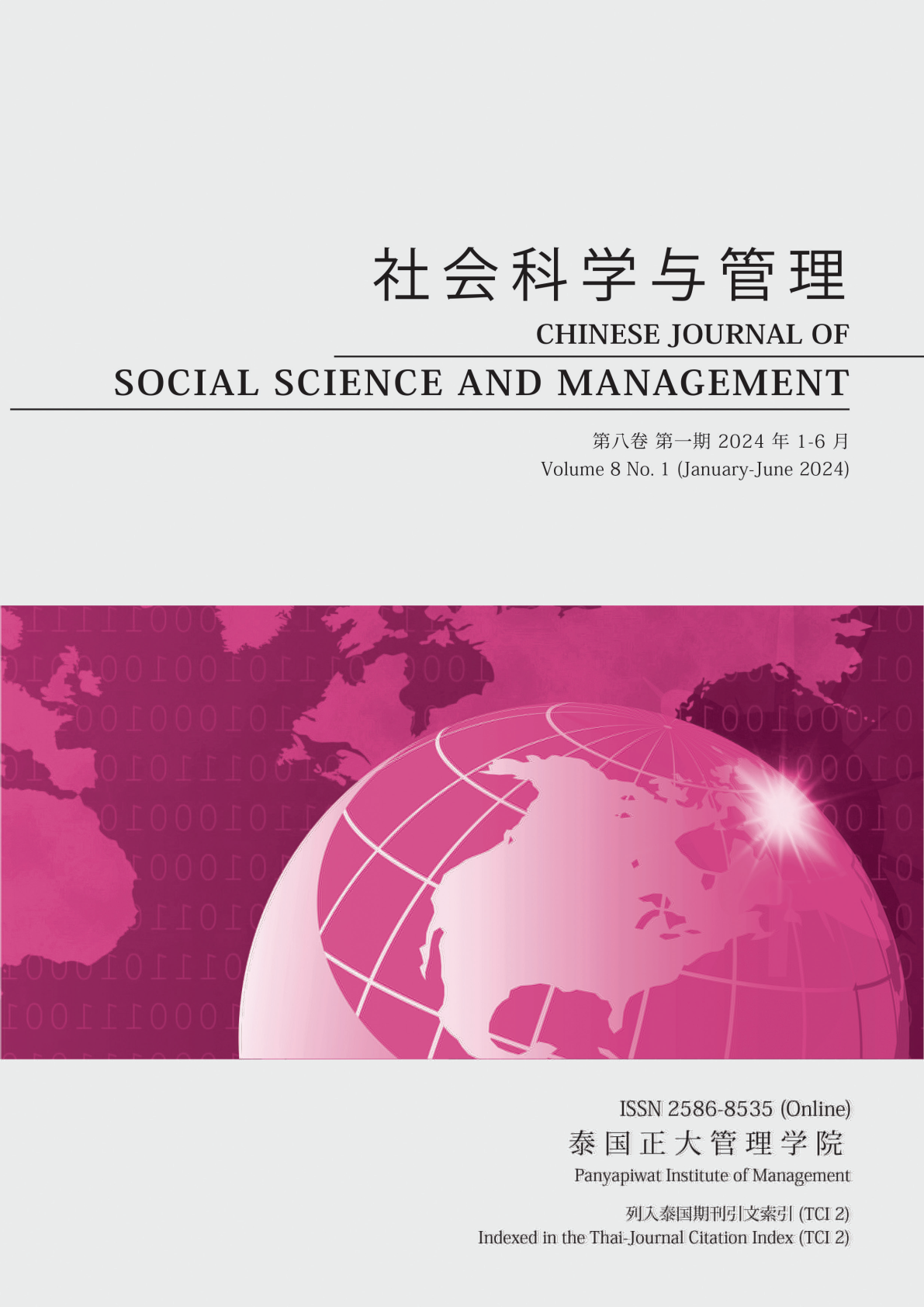THE EFFECT OF PERFORMANCE PRESSURE ON UNETHICAL PRO-ORGANIZATIONAL BEHAVIOR BASED ON THE PERSPECTIVE OF EGO DEPLETION THEORY
Main Article Content
Abstract
The main purpose of this study is to explore whether, how and when performance pressure affects the unethical pro-organizational behavior of employees. Based on the perspective of ego-depletion theory, we propose that ego depletion and moral identity are the mediator and moderator in the relationship between performance pressure and unethical pro-organizational behavior, respectively. In order to test the theoretical hypotheses, we distributed 400 questionnaires through the Questionnaire Star online survey tool. A total of 333 valid samples were collected, and SPSS 26.0 and MPLUS 8.0 were used for the corresponding data analysis, which primarily employed confirmatory factor analysis, descriptive statistical analysis and hypotheses testing. The data results supported the hypotheses and the following conclusions were drawn: there was a significant positive correlation between performance pressure and employee pro-organizational unethical behavior, ego depletion played a mediating role in the relationship between performance pressure and unethical pro-organizational behavior, and moral identity not only negatively moderated the direct effect of ego depletion on unethical pro-organizational behavior but also negatively moderated the indirect effect of performance pressure on unethical pro-organizational behavior via ego depletion.
Article Details

This work is licensed under a Creative Commons Attribution-NonCommercial-NoDerivatives 4.0 International License.
Chinese Journal of Social Science and Management Editorial Division
The Office of Research and Development, Panyapiwat Institute of Management
85/1 Moo 2, Chaengwattana Rd., Bang Talat, Pakkred, Nonthaburi 11120, Thailand
Tel. 02 855 01048 E-mail: cjssm@pim.ac.th
References
Aiken, L. S., West, S. G., & Reno, R. R. (1991). Multiple regression: Testing and interpreting interactions. Sage.
Aquino, K., & Reed II, A. (2002). The self-importance of moral identity. Journal of Personality and Social Psychology, 83(6), 1423-1440.
Baron, R. M., & Kenny, D. A. (1986). The moderator–mediator variable distinction in social psychological research: Conceptual, strategic, and statistical considerations. Journal of Personality and Social Psychology, 51(6), 1173-1182.
Baumeister, R. F., & Heatherton, T. F. (1996). Self-regulation failure: An overview. Psychological Inquiry, 7(1), 1-15.
Baumeister, R. F., Bratslavsky, E., Muraven, M., & Tice, D. M. (1998). Ego depletion: Is the active self a limited resource? Journal of Personality and Social Psychology, 74(5), 1252-1265.
Eisenberger, R., & Aselage, J. (2009). Incremental effects of reward on experienced performance pressure: Positive outcomes for intrinsic interest and creativity. Journal of Organizational Behavior, 30(1), 95-117.
Gardner, H. K. (2012). Performance pressure as a double-edged sword: Enhancing team motivation but undermining the use of team knowledge. Administrative Science Quarterly, 57(1), 1-46.
Hall, D. T., & Chandler, D. E. (2005). Psychological success: When the career is a calling. Journal of Organizational Behavior, 26(2), 155-176.
Hobfoll, S. E. (2001). The influence of culture, community, and the nested-self in the stress process: Advancing conservation of resources theory. Applied Psychology, 50(3), 337-421.
Lanaj, K., Johnson, R. E., & Wang, M. (2016). When lending a hand depletes the will: The daily costs and benefits of helping. Journal of Applied Psychology, 101(8), 1097-1110.
Li, Z. C., Wang, Z., Zhu, Z. B., & Zhan, X. J. (2018). Performance pressure and unethical pro-organizational behavior: Based on cognitive appraisal theory of emotion. Chinese Journal of Management, 15(3), 358-365. [in Chinese]
Lin, Y. H., & Yu, X. Q. (2020). Why do team members engage in unethical pro-team behavior? The impact of team performance pressure. Human Resource Development of China, 37(7), 34-46. [in Chinese]
Mischel, W., Shoda, Y., & Rodriguez, M. L. (1989). Delay of gratification in children. Science, 244(4907), 933-938.
Mitchell, M. S., Baer, M. D., Ambrose, M. L., Folger, R., & Palmer, N. F. (2018). Cheating under pressure: A self-protection model of workplace cheating behavior. Journal of Applied Psychology, 103(1), 54-73.
Mitchell, M. S., Greenbaum, R. L., Vogel, R. M., Mawritz, M. B., & Keating, D. J. (2019). Can you handle the pressure? The effect of performance pressure on stress appraisals, self-regulation, and behavior. Academy of Management Journal, 62(2), 531-552.
Mulder, L. B., & Aquino, K. (2013). The role of moral identity in the aftermath of dishonesty. Organizational Behavior and Human Decision Processes, 121(2), 219-230.
Reynolds, S. J., & Ceranic, T. L. (2007). The effects of moral judgment and moral identity on moral behavior: An empirical examination of the moral individual. Journal of Applied Psychology, 92(6), 1610-1624.
Rupp, D. E., Shao, R., Thornton, M. A., & Skarlicki, D. P. (2013). Applicants’ and employees’ reactions to corporate social responsibility: The moderating effects of first-party justice perceptions and moral identity. Personnel Psychology, 66(4), 895-933.
Umphress, E. E., & Bingham, J. B. (2011). When employees do bad things for good reasons: Examining unethical pro-organizational behaviors. Organization Science, 22(3), 621-640.
Umphress, E. E., Bingham, J. B., & Mitchell, M. S. (2010). Unethical behavior in the name of the company: The moderating effect of organizational identification and positive reciprocity beliefs on unethical pro-organizational behavior. Journal of Applied Psychology, 95(4), 769


